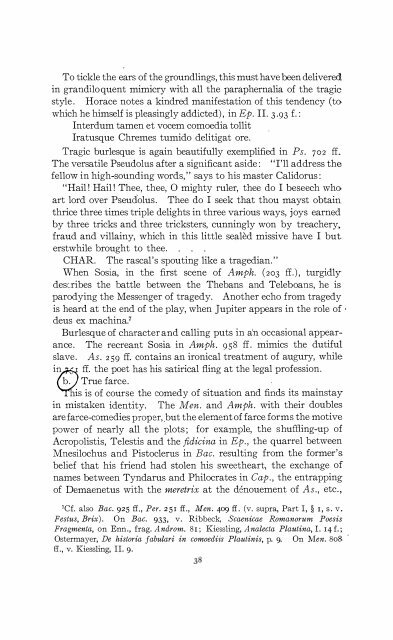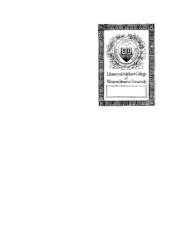You also want an ePaper? Increase the reach of your titles
YUMPU automatically turns print PDFs into web optimized ePapers that Google loves.
To tickle the ears of the groundlings, this must have been delivered<br />
in grandiloquent mimicry with all the paraphernalia of the tragic<br />
style. Horace notes a kindred manifestation of this tendency (to<br />
which he himself is pleasingly addicted), in Ep. II. 3.93 f. :<br />
Interdum tamen et vocem comoedia tollit<br />
Iratusque Chremes tumido delitigat ore.<br />
Tragic burlesque is again beautifully exemplified in Ps. 702 ff.<br />
The versatile Pseudolus after a significant aside : "I'll address the<br />
fellow in high-sounding words," says to his master Calidorus :<br />
"Hail ! Hail ! Thee, thee, 0 mighty ruler, thee do I beseech who<br />
art lord over Pseudolus. Thee do I seek that thou mayst obtain<br />
thrice three times triple delights in three various ways, joys earned<br />
by three tricks and three tricksters, cunningly won by treachery,<br />
fraud and villainy, which in this little sealed missive have I but<br />
erstwhile brought to thee.<br />
CHAR. The rascal's spouting like a tragedian."<br />
When Sosia, in the first scene of Amph. (203 ff.), turgidly<br />
describes the battle between the Thebans and Teleboans, he is<br />
parodying the Messenger of tragedy. Another echo from tragedy<br />
is heard at the end of the play, when Jupiter appears in the role of ·<br />
deus ex machina.1<br />
Burlesque of character and calling puts in a'n occasional appear<br />
ance. The recreant Sosia in Amph. 958 ff. mimics the dutiful<br />
slave. As. 259 ff. contains an ironical treatment of augury, while<br />
i($2 ff. the poet has his satirical fling at the legal profession.<br />
b. True farce. .<br />
is is of course the comedy of situation and finds its mainstay<br />
in mistaken identity. The Men. and Amph. with their doubles<br />
are farce-comedies proper,.but the element of farce forms the motive<br />
power of nearly all the plots ; for example, the shuffling-up of<br />
Acropolistis, Telestis and the fidicina in Ep., the quarrel between<br />
Mnesilochus and Pistoclerus in Bac. resulting from the former's<br />
belief that his friend had stolen his sweetheart, the exchange of<br />
names between Tyndarus and Philocrates in Cap., the entrapping<br />
of Demaenetus with the meretrix at the denouement of As., etc.,<br />
7Cf. also Bac. 925 ft., Per. 251 ft., Men. 409 ft. (v. supra, Part I, § I, s. v.<br />
Festus, Brix). On Bac. 933, v. Ribbeck, Scaenicae Romanorum Poesis<br />
Fragmenta, on Enn., frag. A ndrom. 8 I ; Kiessling, A nalecta Plautina, 1. 1 4 f.;<br />
Ostermayer, De historia fabulari in comoediis Plautinis, p. 9. On Men. 808·<br />
ff., v. Kiessling, II. 9.
















